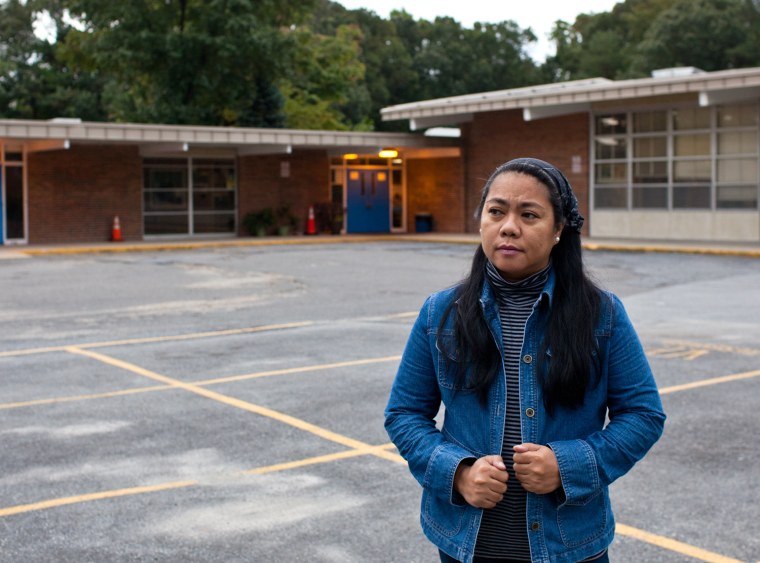As teacher Maria Ursula Raymundo stared out at the desert landscape bouncing past, she found herself thinking about where she would have been if her life hadn’t been turned upside-down by a bureaucratic nightmare: On bus duty at the suburban Maryland elementary school where she had taught P.E. for four years.
Instead, she was traveling the desolate back roads of Arizona and New Mexico in a van with a group of fellow Filipino teachers, hoping to find a school that would give them jobs before their American dreams vanished once and for all.
“It’s about your life … changing suddenly without warning,” said Raymundo, a 47-year-old from Manila, recalling the recent job-search expedition across the U.S. “We are not citizens, we are not green card holders … it’s not like you just pack your things and you move onto the next street or you move onto the next state, our home is (thousands of) miles away.”
Raymundo is one of nearly 1,050 foreign teachers caught in the middle of a Byzantine workplace dispute between the Prince George’s County (Md.) Public Schools and the U.S. Labor Department over the former’s recruiting under a temporary worker visa program.
But in an unforeseen irony, their lives also have been ripped apart as the result of an international talent hunt prompted by the 2001 passage of the No Child Left Behind Act — the educational centerpiece of the presidency of George W. Bush.
The teachers — most of them from the Philippines, but also from Chile, Colombia, India and the Caribbean — found out by email in April that the school district might not be able to sponsor them again amid a Labor Department investigation of its participation in the federal H-1B program, which allows employers to bring foreign workers into the country temporarily to fill specialty occupations.

Three months later, the district announced that it could not rehire them when their visas expired under the terms of a settlement of the case, in which the Labor Department found that the district “willfully violated” the terms of the program. (An administrative law judge last week signed off on the settlement; meanwhile, some teachers are still exploring if they have any legal recourse.)
The news threw the teachers’ lives into disarray. As their visas began expiring, they faced a stark choice: Drop their lives in Maryland to crisscross the country looking for jobs — even though they technically don’t have the right to work in the U.S. until they find a new sponsor — or go back to their homelands.
It also had serious financial implications. Some had sold land and homes in their native countries or taken out high-interest loans to be able to afford the move to the U.S. Some also had moved their families to Maryland and had bought homes and cars.
An 'emotional massacre'
A few of them already had their “green cards,” entitling them to permanent residency, but others had only just begun the process.
Raymundo, whose work permit expired on July 31, is one of the latter. She is still in the country legally on a tourist visa, living with friends while desperately looking for a new job and trying to cope with what she calls an “emotional massacre.”
The Filipino teachers said they were drawn to Prince George’s County, just outside Washington, D.C., by officials from the school district — one of the nation’s biggest, with 198 schools, more than 127,000 students and nearly 18,000 employees — who went to the Philippines to recruit them through a local job-placement agency.
"We hired temporary foreign national employees at a time when school systems across the country were facing shortages of highly qualified instructors in hard-to-fill subject areas such as math, science and special education, as mandated by the federal No Child Left Behind Act," Briant Coleman, a district spokesman, wrote in a statement.
The foreign teachers provided “an exceptional service to our school district,” Coleman said.
Parents in the district also said they brought a high level of energy to the job.
“You see the community centers and how active they are,” said David Edwards, whose daughter attends a school there and who is director of international relations at the National Education Association. “A lot of them are getting their green cards; they’re applying for permanent residency. Their intention is … to immigrate and stay.”
Parents Troy and Dedra Townsend said a Filipino special needs teacher, Maria Urbano, had a big impact on the education of their autistic son, Skylar, who she worked with for more than two years. She saw that he was not lazy but brilliant, and helped get him into a new school, where he now is two grades ahead of his age group, Dedra Townsend said.
“I think those (foreign) teachers brought so much to these kids … I think they went over and above,” said Townsend, a 49-year-old a letter carrier for the U.S. Postal Service. “I think that the kids are going to be at a loss, I really do.”
The teachers first found out that their jobs were at risk in April, when the district informed them about the Labor Department investigation and that agency announced it had charged the school district with “willful violation of the laws that govern the H-1B temporary foreign worker visa program.”
Investigators determined that the district had illegally reduced the wages of 1,044 foreign teachers hired under the H-1B program by requiring the payment of $4.22 million in fees.
The H-1B visa provides a three-year permit that can berenewed for up to three more years. The idea is “to help employers who cannot otherwise obtain needed business skills and abilities from the U.S. workforce,” the Labor Department says on its website.
The H-1B program mandates that employers pay certain fees incurred when they use the program. “Instead of paying these fees, (the school district) required the foreign teachers to pay them. As a result, the teachers' earnings were reduced below the amount legally required to be paid,” the Labor Department said in April.
In its original announcement, the agency said the district faced another $1.74 million in civil money penalties and could be debarred from “filing new petitions, requests for extensions or requests for permanent residency for foreign workers under any employment-based visa program.” It noted that violations were “willful when an employer knew or acted in reckless disregard for whether its actions were impermissible.”
The news sent shockwaves rippling through the county’s international teaching community, but the educators initially were hopeful the matter would be resolved when they said they received emails from the district asking them to submit their paperwork for visa renewal in May. An ominous lull in communications followed.
On July 7, the district announced that, as part of the settlement, it would pay the $4.22 million to the Labor Department, which would in turn give the money to the foreign workers. It also stated that it was barred from participating in the H-1B visa program for two years — meaning it could not renew the teachers’ work permits during this time.
'Not the outcome we had hoped for'
Coleman said the Labor Department, “agreed to reduce the proposed civil money penalty to $100,000 contingent on the board’s agreement to terminate all visa sponsorship programs effective July 1, 2011.”
“Obviously, this is not the outcome we had hoped for as these employees have provided an exceptional service to our school district. (The school district) did everything possible to retain these excellent and valued employees,” he said in a statement. “However, in the final analysis of the current state of our shrinking school budget and mounting legal fees, we determined that we simply could not afford to continue to operate this program.”
Coleman, who noted that the district faced a $150 million budget shortfall in the coming year, said the teachers were not promised a green card or permanent residency — only that they would be employed until their visas expired if they performed well. The district's last foreign teacher visa will expire in 2013.
“This decision is in the best interest of our school district and marks the end of a challenging chapter in our school district’s efforts to meet the mandates of the federal government’s No Child Left Behind Act,” he added.
The U.S. has for many years been an importer of skilled teachers from overseas.
Nearly 19,800 foreign teachers were potentially working in the U.S. on temporary visas in 2009, according to the American Federation of Teachers, AFL-CIO. And some 4,930 green cards were certified for teachers from 2006 to 2010, with a majority of them – 28 percent – being from the Philippines, followed by Mexico, India, Colombia and Canada, it said.
Edwards, the NEA official, said his organization began to notice the trend of importing teachers in the late 1990s. Among the institutions hiring the teachers are hard-to-staff schools, urban districts, and charter and private schools, according to the American Federation of Teachers.
Nearly all the foreign teachers in Prince George’s County are members of the local NEA affiliate, whose membership numbers 3.2 million nationwide. Edwards said his organization pushed for labor laws to be enforced regarding foreign teachers, but had serious problems with the results in this case.
'Doubly victimized'
“At one point we came out, we were glad they were doing the investigation because we felt that these were teachers who were being exploited and we also felt that employers were using this way to kind of create a sort of sub-tier of teaching category … that wouldn’t necessarily have due process, it would be sort of at-will employees,” he said.
But with the outcome, he said, “We feel that they have been doubly victimized. We disagree with the remedy, the unintended consequences as a result of the debarment that is basically putting the burden back on these vulnerable workers, who are going to have to uproot their lives.”
Edwards said foreign teachers are particularly vulnerable, noting that he had heard of cases in California where international instructors were terminated simply by not having their visas renewed.
“It’s the new form of termination in the global economy,” he said. “You can just have this sort of disposable labor force, and not just the labor force you think about, but the knowledge labor force, I mean the people that are teaching our kids.”
While the scenario in Prince George’s County wasn’t driven purely by economics, the outcome has been just as devastating.
Among the foreign teachers dealing with the fallout is Ximena Meneses, a Spanish-language middle school teacher in the district for four years.
A native of Chile, Meneses had bought a home, and moved her husband, Alvaro Brito — who does not have the legal right to work in the U.S. — and their son, Alvaro Jr. They had been in the U.S. for seven years and she had begun the application process for the green card in September 2010.
Today, Meneses is sleeping on a mattress on the floor of a friend’s home in Virginia, where she found a teaching job that pays about $22,000 less than her old one.

“What happened to me has happened 1,000 times … you’ve got 1,000 stories. Which one is the worst?” she asked. “All of them are.”
“My heart is full of pain,” said Meneses, who noted she was named teacher of the month in June at her old school. “I am a good teacher. I love teaching. … It happened here in this country that I really love.”
Other school districts and educational institutions (religious, charter and private schools, a pre-school and public school districts and teacher’s placement groups) have been found to have violated the H-1B visa program: 19 in Texas, Ohio, New York, Florida, California, Georgia and New Jersey.
The Labor Department found another school district — Dayton (Ohio) Public Schools — to be a willful violator of the program, too, in November 2007.
The Labor Department began its investigation into Prince George's County Public Schools in 2007, an agency spokesperson said in an email. Under the law, an employer who willfully violates the wage provisions of the program must be debarred for at least two years.
Enforcement creates a strong incentive for other employers to follow the law, and as a result of the Prince George’s case, two other large school districts that use the program have determined they made “impermissible deductions from H-1B teachers’ pay similar to the ones made by (Prince George’s) … and will reimburse H-1B workers for fees already charged,” the spokesperson said.
Whether the district’s actions were willful or not, Raymundo is dealing with the fallout. She said she often finds herself asking, “Why are we victims and where is justice?”
Like other teachers, she is searching all potential avenues to try and find another teaching job in the U.S. But she also is steeling herself for the worst — a return to the Philippines and the uncertain job prospects she would face there — and trying to stay optimistic.
“I am preparing myself emotionally to go home in October,” she said. “It is not the end of the world, you know, one door is closed now, but another window will open tomorrow.”
